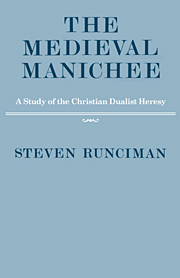Book contents
- Frontmatter
- Contents
- CHAPTER I Introduction
- CHAPTER II The Gnostic Background
- CHAPTER III The Paulicians
- CHAPTER IV The Bogomils
- CHAPTER V The Patarenes
- CHAPTER VI The Cathars
- CHAPTER VII The Dualist Tradition
- APPENDIX I The Greek Sources for Paulician history
- APPENDIX II Heretical Movements in the Eighth Century
- APPENDIX III Various Names given to the Dualist Heretics in Europe
- APPENDIX IV Dualism, Buddhism and Occultism
- BIBLIOGRAPHY
- ADDITIONS (1982)
- INDEX
APPENDIX IV - Dualism, Buddhism and Occultism
- Frontmatter
- Contents
- CHAPTER I Introduction
- CHAPTER II The Gnostic Background
- CHAPTER III The Paulicians
- CHAPTER IV The Bogomils
- CHAPTER V The Patarenes
- CHAPTER VI The Cathars
- CHAPTER VII The Dualist Tradition
- APPENDIX I The Greek Sources for Paulician history
- APPENDIX II Heretical Movements in the Eighth Century
- APPENDIX III Various Names given to the Dualist Heretics in Europe
- APPENDIX IV Dualism, Buddhism and Occultism
- BIBLIOGRAPHY
- ADDITIONS (1982)
- INDEX
Summary
There has been so much loose thinking, fostered in particular by the Theosophists and the Neo-Occultists, of the connection of the Dualist Tradition with Eastern religion on the one hand, and with the Occult Tradition on the other, that it is necessary to add a little further clarification.
The resemblance between Cathar-Bogomil asceticism and Indian asceticism has often struck observers. Marco Polo says of Brahmin austerities (bk. III, chap. 20): “In fact they are worse in those whims than so many Patarenes.” But, though the practice is similar, the underlying theory is different. To the orthodox Christian, Matter is bad, as a result of the Fall, but can be made good through Christ's sacraments. To the Christian Dualist, Matter is irretrievably bad. To the Brahmin and, still more, to the Buddhist, Matter is an irrelevant thing. The Buddhist initiate is ascetic to show his indifference to material things, or to demonstrate his contempt for them. This difference is so fundamental that there can be no question of the Christian Dualists having felt the influence of Buddhist teaching, except through indirect channels. As we have seen, certain Buddhist stories containing a practical but nor a theological moral, like Barlaam and Josaphat, were adopted by the Gnostic Dualists. But their religious import must not be ranked too high. Christian Dualist doctrines are far more closely akin to those of the Zoroastrians, on which they were doubtless partially based. Zoroastrianism is a very different religion to Buddhism, and its theory of Matter far cruder.
- Type
- Chapter
- Information
- The Medieval ManicheeA Study of the Christian Dualist Heresy, pp. 186 - 188Publisher: Cambridge University PressPrint publication year: 1982



